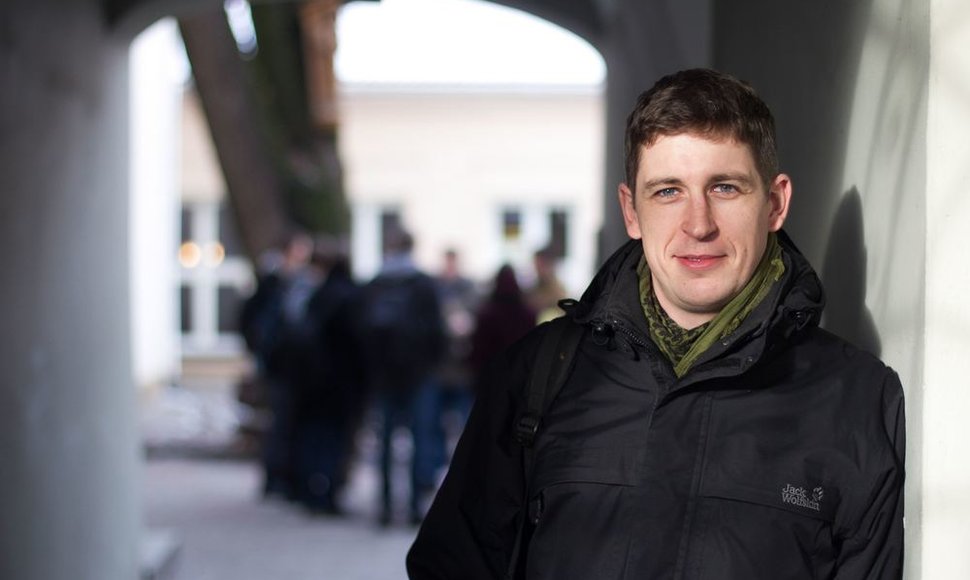Among these are “Kurkliai, capital of the 16 February” and “Guerillas of Trakiniai” – the 28-year-old history student suggests ways to celebrate national dates merrily and without the usual pathos associated with state events.
When Norbertas first came up with the idea to hold a 16 February Independence Day festival in Kurkliai, a small town in the district of Anykščiai, the local community and authorities were sceptical. No one expected the idea would attract so much popularity.
“We started with a big slogan: 'Kurkliai – capital of the 16 February'. And the reaction was: 'capital, yeah right...',” the historian recounts.
But there were facts he could use to substantiate why Kurkliai deserved the title. Firstly, Steponas Kairys, author of the 16 February Independence Act (1918) and one of its signatories, came from here. The document was illegally printed in a printing house on Totorių Street in Vilnius, owned by Martynas Kukta. Kukta, too, came from Kurkliai.
Moreover, 30 years later, when Lithuania lost its independence and guerilla fighters went on fighting the Soviet Red Army in forests, one of guerilla leaders Juozas Šibaila-Merainis set up his headquarters near Kurkliai. Šibaila-Merainis co-authored and was a signatory of a document that was adopted in an assembly of guerillas on 16 February 1949.
Rallying point for entire town
“Now, the municipal authorities do not need to be persuaded. To be honest, I do not have to do much work myself this year. Everything moves by itself. It is unique, there probably isn't any other festival like that in Lithuania,” Černiauskas rejoices.
The entire town of Kurkliai contributes to throwing the 16 February celebration: the municipality, the local school, the Arts Centre, the parish priest, the official town community, local farmers, hunters, people from Šiauliai Union, army volunteers, entrepreneurs who come from Kurkliai.
“I'm very happy with what I see. Granted, there are things to improve, since festivities like this one need their traditions to be built from scratch. Everything that was done until the war has been swept away. Local traditions of celebrating the Independence Day from between the wars were very beautiful, entire townships would assemble to commemorate the day – but all this is gone and there's no point in reconstructing the same thing,” the historian believes.
Celebrations in Kurkliai are usually attended by several hundred people. “It might not seem like a lot, but look at how many people turn up at similar events in other towns. 20-30? If they hold any events to begin with,” Černiauskas notes.
Procession of 95 flags
The Independence Day celebrations in Kurkliai start off with a tribute to Independence Act signatory Steponas Kairys in his native house. Then the crowd proceeds across the town, towards a monument for local guerillas and their graves. Then people light bonfires, play music, share tea. About nightfall, festivities move to the local school, were pupils and enthusiast can show what they've got.
The centrepiece of this year's celebrations is the procession of 95 flags along the streets of Kurkliai. It is the 95th anniversary of the 16 February Independence Act, proclaimed in 1918. The 95 tricolours from the procession will be given away to townsfolk who do not have or cannot afford one.
“The idea is to make Kurkliai a town where, next year, every single house sports a flag. We try to add a historic context to every celebration, to give something new, to share previously unknown facts and interesting bits of information about the Independence Day. The goal is to avoid it being dull – if you make people listen to official speeches for hours, no one will remember anything and no one will come the next time,” he says.
Two fears
The historian reveals that when he started organizing the event, he had two fears in his mind. The first one was the fear that the event might get appropriated by one political party. The second fear was to attract what Norbertas calls “perverted right-wingers” – the likes of those who organize the notorious nationalist marches in Vilnius on 11 March every year.
“They are stuck in the past – they do not look for new things, new approaches to patriotism. They are Bugailiškis Prūdas types (a chauvinist character in a political satire show on Lithuanian TV – 15min). But if you look at national dates with different eyes, approach them differently and professionally, you can see that patriotism is possible without this Prūdas. All depends on your attitude,” Norbertas says about the so-called patriotic youth.













